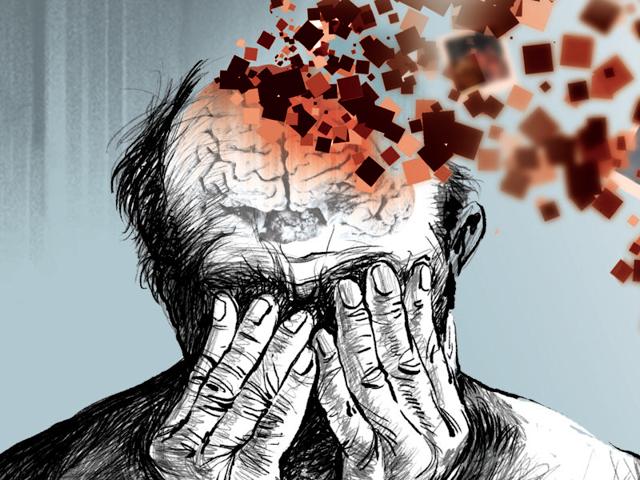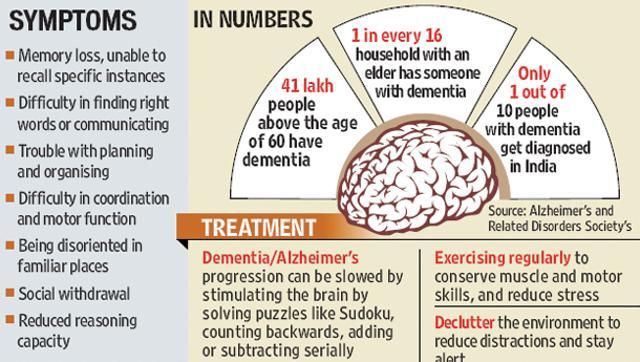Memory check: Never dismiss dementia as an old-age problem
Lack of systematic care, poor awareness and the tendency to dismiss early signs are adding to the woes of dementia patients and caregivers.
He suffers from dementia, a memory disorder that makes people withdrawn, disoriented and forgetful. “We found him on the pavement, seven years ago. His left hand was injured and infested by maggots. We got him here to get treated,” says Dr GP Bhagat, founder of Delhi-based Guru Vishram Vridh Ashram, an old-age home to 100 people at any given time. “Many of them have dementia and don’t remember where their homes are.”

According to the Alzheimer’s and Related Disorders Society of India, 41 lakh seniors above 60 suffer from dementia in the country. One among every 16 households grapple with taking care of a dementia patient. “We are a country in transition. While on one hand we are losing traditional family support, on the other we lack organised places that care for the elderly and vulnerable,” says Dr Nimesh Desai, senior psychiatrist at Institute of Human Behaviour and Allied Sciences (IHBAS). “As most people can’t afford to hire caretakers, they end up abandoning seniors with disorders such as Alzheimer’s.”
Read: 4.1m Indians live with dementia; UK report predicts more
“The first sign of dementia, particularly Alzheimer’s is memory problems, but these are often dismissed as signs of old age,” says Dr Sundeep Jadhav, neuro psychiatrist and director of Manav Neuro Psychiatric Hospital at Kalyan, Mumbai. “If a person forgets instances from the recent past and details which could cause difficulties in everyday living then he or she must get checked for dementia.”

Doctors also say that in a family setting, dementia patients should not be locked up. “In fact, they should be encouraged to move around the house and in the neighbourhood, where people recognise them,” says Desai. “Regular exposure to natural light is also a must.”
Read: Don’t worry, be happy: Stress, anxiety could lead to dementia
Identification bracelets or wristbands help too, adds Dr Sameer Malhotra, director for mental and behavioural sciences at Max Healthcare. “Wristbands with their name and contact number or a kada (bangle) or bracelet with this information should be on the person at all times. Clothes embroidered with the information is another option,” says Dr Malhotra.
Another recommendation is to keep patients engaged in mentally stimulating games and activities.
“This disease cannot be reversed but its progression can be certainly reined in by keeping the brain busy. Games such as Sudoku, reverse counting, skip counting, subtracting or adding serially and playing cards help people stay alert,” Malhotra adds.
Withering away
Inder Dutt, 69, Delhi
Missing since October 15
Dutt left home without his wallet and cellphone on October 15, and hasn’t returned yet.
Two years ago, he was diagnosed with Alzheimer’s, but had started showing symptoms almost a decade ago, after retirement. “He would compulsively set up the washing machine every morning or cook even if he did not want to eat,” says Dutt’s son Vaibhav. “Next, he became withdrawn, which was unlike him.” The family took him to three different physicians, who dismissed the symptoms as old-age problems. He was finally taken to a neurologist, who realised that Dutt was suffering from Alzheimer’s.

Dutt’s wife Manju looked after him along with his two sons. The brothers ensured that the parents were never alone at home. Yet, Dutt walked away. “I don’t know how he could have just forgotten everything,” says a baffled Vaibhav.
Over the past four months, the family has looked for him everywhere — night shelters, temples, hospitals and morgues. A missing complaint with the police has been filed too.
Read: If detected during early stages, dementia can be managed, say doctors
Meera Chandawarkar, 79, Mumbai
Unable to feed herself
Search engine Google helped Mumbai-based landscape artist Shilpa Chandawarkar figure out that her mother-in-law Meera has dementia. “She was unable to read the time or understand currency and would misspell words,” says Chandawarkar, 45. Then one day, four years ago, Meera had left her watch in the refrigerator. “We went to a neurologist who told us that such memory problems were to be expected at her age,” says Chandawarkar.
As the problem persisted, a few months later they took her to another doctor who repeated the same thing. Finally, the third doctor suggested an MRI scan and realised that her brain cells were shrinking and prescribed medicines. “No one sat us down and told us about the enormity of the disease.”
After contacting NGO Silver Innings Foundation, they realised that it was a lifelong condition. Shilpa then quit her job to take care of Meera full time. But last year, when Meera’s cognitive functions deteriorated to the extent that she couldn’t feed herself, the family admitted her to Snehanjali, an assisted living centre for elders in Nallasopara.
Catch your daily dose of Fashion, Taylor Swift, Health, Festivals, Travel, Relationship, Recipe and all the other Latest Lifestyle News on Hindustan Times Website and APPs.
Catch your daily dose of Fashion, Taylor Swift, Health, Festivals, Travel, Relationship, Recipe and all the other Latest Lifestyle News on Hindustan Times Website and APPs.





